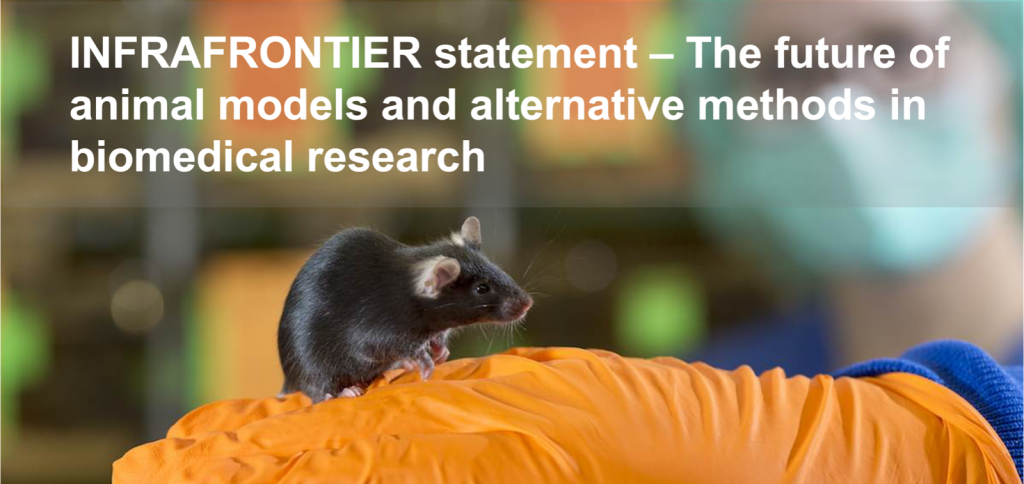UPDATE 25.07.2023
Read the answer of the European Commission to the European Citizen Initiative HERE

Our position on the European Citizen Initiative “Save Cruelty-Free Cosmetics – Commit to a Europe without animal testing”
Munich, 18/07/2023
At INFRAFRONTIER – the European Research Infrastructure for Modelling Human Diseases –, we are deeply concerned about the consequences that a total ban on animal research would bring to the biomedical research and health care landscape in Europe. A scenario that could become a reality if the European Commission (EC) meets the demands raised in the European Citizen’s Initiative “ Save Cruelty-Free Cosmetics – Commit to a Europe without animal testing”.
Pending the EC’s response to the initiative, we would like to briefly express our arguments and major concerns:
Animal models, specifically mice, have been indispensable for answering fundamental and translational questions in biomedicine for many decades, and will continue to play a significant role in shaping the future research landscape while the development of alternative methods proceeds. For now, animal research remains irreplaceable for many procedures conducted in:
- Basic research. Mice allow researchers to investigate fundamental biological processes in mammalian development and physiology.
- Disease modelling. Mouse models are used to study the complexity of human disease conditions on the organismic level. This includes the study of predisposing genetic factors, the progression of the disease, or the effect of the exposure to environmental factors, among other levels of analysis. In the near future, we can expect to see further advancements in disease modelling, combining in vivo, in vitro and in silico methods.
- Drug and therapy development. Preclinical studies in mice provide invaluable insights into the efficacy and safety of potential drugs before human clinical trials. The selection of the most promising drug candidates together with rigorous testing, prevents unnecessary risks to patients. A recent example is the rapid development of the COVID-19 vaccine using mRNA technology, which would not have been possible without animal experiments.
- Personalised medicine. The next decade will witness an increased emphasis on personalised medicine, and mice that carry humanised genes and patient-derived cells, will help researchers to tailor individualised treatments.
We all share the concern for animal welfare, whether we are researchers, citizens, or animal rights advocates. Moreover, the European Union (EU) guarantees through strict regulations that the use of animals in research is always justified and carried out by qualified professionals in registered institutions, and only when alternative methods are not yet available. Researchers must treat animals with respect, ensuring their well-being, minimising pain and distress to the greatest extent possible, and implementing protocols that support the reduction of animal usage. It is also their obligation to develop alternative methods to progressively replace the involvement of animals in the advancement of biomedicine to improve human health.
A ban of all animal experiments in the EU would impair many scientific projects where animal models continue to be indispensable, such as in the field of human rare diseases. Furthermore, it would also result in the relocation of biomedical research in other world regions. Not only would Europe lose its global scientific leadership, but animal research would only take place in regions that may not share the European animal welfare standards.
At INFRAFRONTIER, we are already contributing to the replacement, reduction, and refinement of animal models with the development of alternative methods in biomedical research, and we strongly support the efforts made by the EU to encourage their advancement. However, in vitro and in silico alternative methods have often serious limitations in replicating the complexity and systemic response of a living organism. The intricate interactions among cells, organs, and physiological systems within the human body underscore the ongoing need for animal models in biomedical research.
For these reasons, the future advancement of (precision) biomedicine will build on the strengths of combining in vivo, in vitro, and in silico approaches, and we are eager to contribute our extensive resources and expertise to this transformative path. As we navigate this evolving landscape, we will remain committed to promoting responsible and ethical research practices, while striving for advancements that will ultimately improve human health.
INFRAFRONTIER
www.infrafrontier.eu